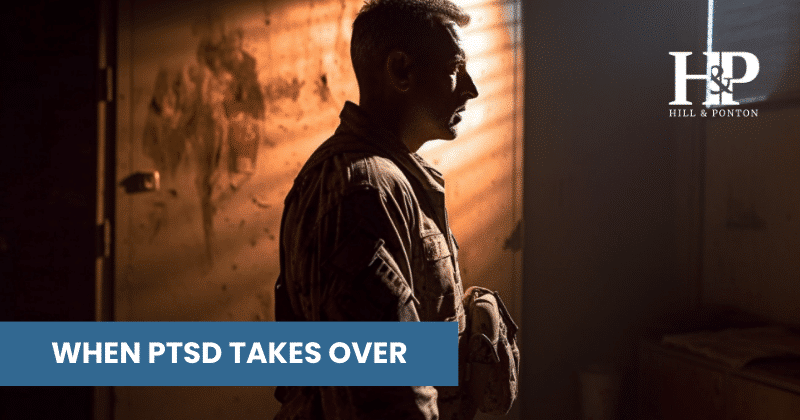Post-traumatic stress disorder (PTSD) is a mental health condition that can result from experiencing or witnessing a traumatic event.
One of the most common symptoms of PTSD is difficulty controlling emotions, which can lead to anger, irritability, and outbursts.
For many individuals with PTSD, this difficulty in controlling emotions can have a profound impact on their daily lives, causing relationship problems, difficulty at work, and even legal troubles.
Seeking help for this symptom is crucial, and it may be possible to receive service-connected disability benefits for total disability based on individual unemployability (TDIU) if it is impacting your ability to work.
In this post, we will explore the impact of difficulty controlling emotions on daily life, as well as the importance of seeking help and getting service-connected for TDIU.
How PTSD Can Lead to Difficulty Controlling Emotions
PTSD, or post-traumatic stress disorder, is a mental health condition that can develop after a person experiences or witnesses a traumatic event.
It’s a complex disorder that can affect various aspects of a person’s life, including their emotions.
Individuals with PTSD may experience a range of emotional difficulties, including difficulty controlling their emotions.
This can manifest in various ways, such as sudden outbursts of anger, irritability, anxiety, or fear.
The link between trauma and emotion is complex, but research has shown that trauma can have a profound impact on the brain, affecting how it processes information and responds to stimuli.
Trauma can also affect the body’s stress response system, leading to a heightened state of arousal and sensitivity to triggers.
As a result, individuals with PTSD may find that certain situations or triggers can lead to a sudden and overwhelming emotional response.
These triggers can be different for each person, but common examples include loud noises, crowded spaces, or situations that remind them of their traumatic experience.
Effects of Difficulty Controlling Emotions on Daily Life
PTSD can have a profound impact on an individual’s ability to regulate their emotions.
The constant state of hyperarousal and hypervigilance that individuals with PTSD experience can lead to difficulty controlling their emotions, which can have significant effects on their daily life.
Common Problems Associated with Difficulty Controlling Emotions
Here are some common problems associated with difficulty controlling emotions due to PTSD:
- Relationship Difficulties: Uncontrolled outbursts of anger, irritability, and emotional withdrawal can strain relationships with friends, family, and romantic partners.
- Employment Difficulties: Individuals with PTSD may struggle to maintain employment due to difficulty managing their emotions in the workplace. This can lead to missed workdays, strained relationships with colleagues, and even termination.
- Isolation: Difficulty controlling emotions can cause individuals to avoid social situations, leading to feelings of loneliness and isolation.
Escalation of Emotion and Emotional Behaviors
Uncontrolled emotions can escalate quickly, leading to behaviors that can be harmful to oneself and others. Examples of emotional behaviors include:
- Aggression: Individuals with PTSD may lash out in anger, leading to verbal or physical aggression towards others.
- Self-Harm: Uncontrolled emotions can lead to self-destructive behavior, including self-harm.
- Substance Abuse: Some individuals with PTSD may turn to drugs or alcohol to cope with their emotions, leading to addiction and additional health problems.
Impact on Physical and Mental Health
The impact of difficulty controlling emotions on physical and mental health can be significant. Here are some examples:
- Physical Health: Individuals with PTSD may experience physical health problems due to chronic stress and uncontrolled emotions. These can include high blood pressure, heart disease, and digestive issues.
- Mental Health: Uncontrolled emotions can lead to increased symptoms of depression and anxiety, as well as other mental health conditions.
It is essential for individuals with PTSD to seek help for their difficulty controlling emotions to improve their quality of life and manage the potential negative consequences of uncontrolled emotion.
Getting Help with Managing Emotions
Seeking help from a mental health professional is crucial for managing difficulty controlling emotions associated with PTSD.
There are several types of therapy that can be helpful for managing difficult emotions.
One common therapy is cognitive-behavioral therapy (CBT), which aims to identify negative patterns of thinking and behavior and replace them with positive ones.
CBT can help individuals with PTSD to recognize the triggers of their difficult emotions and develop strategies to manage them.
Another therapy that can be effective for managing difficult emotions is eye movement desensitization and reprocessing (EMDR).
This therapy involves recalling traumatic memories while simultaneously following a therapist’s eye movements or other external stimuli.
The goal is to reprocess the traumatic memory and reduce the emotional intensity associated with it.
In addition to therapy, there are also emotion management techniques that individuals can use in their daily lives.
These techniques include mindfulness, deep breathing exercises, and progressive muscle relaxation.
Practicing these techniques regularly can help individuals to better manage their emotions and reduce the frequency and intensity of difficult emotions.
It’s important to remember that seeking help from a mental health professional is not a sign of weakness!
In fact, it takes great strength to recognize that you need help and take the necessary steps to get it.
A mental health professional can provide support and guidance on managing difficult emotions, and can help individuals develop personalized strategies for coping with PTSD symptoms.
Were you denied benefits for PTSD and need help filing an appeal? Contact our team today and let us help.

Therapy Options for Emotion Management
Therapy can be a valuable tool for individuals with PTSD who struggle with difficulty controlling their emotions.
A trained mental health professional can help individuals develop coping mechanisms and strategies for managing their emotional responses.
There are several types of therapy that may be used to address difficulty controlling emotions associated with PTSD.
How Therapy Can Help
Therapy can be helpful for individuals with PTSD and difficulty controlling emotions in several ways.
First, it can provide a safe and supportive environment for individuals to discuss their emotions and experiences.
This can help individuals feel heard and validated, which can be an important step in the healing process.
Additionally, therapy can provide individuals with practical tools and strategies for managing their emotions, such as relaxation techniques or cognitive-behavioral techniques.
Examples of Therapy Options
There are several types of therapy that may be used to address difficulty controlling emotions associated with PTSD. Some common therapy options include:
Cognitive-Behavioral Therapy (CBT)
CBT is a type of therapy that focuses on identifying and changing negative patterns of thought and behavior.
It can help individuals with PTSD learn to recognize and challenge thoughts that may be contributing to their difficulty controlling emotions.
Exposure Therapy
Exposure therapy is a type of therapy that involves gradually exposing individuals to triggers or situations that cause emotional distress.
This can help individuals with PTSD learn to manage their emotional responses and reduce the impact of triggers over time.
Eye Movement Desensitization and Reprocessing (EMDR)
EMDR is a type of therapy that involves reprocessing traumatic memories and experiences.
It can help individuals with PTSD better manage their emotional responses to triggers by reducing the emotional intensity of traumatic memories.
Emotion Management Techniques
In addition to therapy, there are several techniques that can be used to manage difficulty controlling emotions in daily life.
These techniques can help individuals with PTSD to cope with triggers and manage their emotions more effectively.
Here are some examples:
Deep Breathing
Deep breathing is a simple technique that can help to reduce feelings of anxiety and stress.
To practice deep breathing, find a quiet place where you can sit or lie down comfortably.
Close your eyes and take slow, deep breaths, focusing on the sensation of the air moving in and out of your body.
Try to inhale for four seconds, hold your breath for four seconds, and then exhale for four seconds.
Repeat this cycle for several minutes, or until you feel more relaxed.
Mindfulness
Mindfulness is a technique that involves focusing your attention on the present moment, without judgment.
This can be especially helpful for individuals with PTSD who struggle with intrusive thoughts and memories.
To practice mindfulness, find a quiet place where you can sit or lie down comfortably.
Close your eyes and focus on your breath, allowing thoughts to come and go without attaching any judgment to them.
You can also try focusing on the sensations in your body, such as the feeling of your feet on the ground or the sensation of the sun on your skin.
Practical Tips
In addition to these specific techniques, there are several practical tips that can help with emotion management. These include:
- Taking breaks when feeling overwhelmed
- Setting boundaries with others
- Engaging in physical activity to release tension
- Identifying and avoiding triggers when possible
- Using positive self-talk to reframe negative thoughts
By incorporating these techniques and tips into daily life, individuals with PTSD and difficulty controlling emotions can better manage their symptoms and improve their overall well-being.
Service-Connecting PTSD to TDIU for Veterans
Service-connected PTSD that results in difficulty controlling emotions may make a veteran eligible for Total Disability based on Individual Unemployability (TDIU) benefits.
TDIU benefits provide veterans with compensation at the 100% disability rating level, even if their service-connected conditions do not meet the VA’s disability rating schedule.
To be eligible for TDIU benefits, a veteran must have at least one service-connected disability rated at 60% or higher or two or more service-connected disabilities with a combined rating of 70% or higher, with at least one of those disabilities rated at 40% or higher.
The process of applying for TDIU can be challenging, as it involves providing evidence that your PTSD and difficulty controlling emotions prevent you from maintaining employment.
This can be accomplished by submitting medical evidence, such as a letter from your doctor or therapist, that describes how your symptoms affect your ability to work.
It is also important to provide documentation of your work history, including any attempts to maintain employment despite your symptoms.
Unfortunately, TDIU benefits are not always granted on the first application.
Common reasons for benefits denial include a lack of sufficient medical evidence to support the claim, failure to meet the eligibility criteria, or inconsistencies in the veteran’s reported symptoms. However, veterans have the right to appeal a denial of benefits.
The appeals process can be lengthy and complex, but veterans can seek help from a VA-accredited attorney or agent to navigate the process.
In conclusion, PTSD and difficulty controlling emotions can have a significant impact on a veteran’s daily life and ability to work.
It is important for veterans to seek help from mental health professionals and explore all available treatment options.
If your PTSD-related difficulty controlling emotions prevents you from maintaining employment, you may be eligible for TDIU benefits.
Seeking assistance from a qualified professional and being persistent in your pursuit of benefits can increase your chances of receiving the compensation you deserve.
Want to know more about the claims process or help with filing an appeal?
Hill & Ponton was founded in 1986 and has assisted veterans in their VA claims for the last two decades. Although the old law prevented us from being official representatives for the veterans before the VA, we would advise, pro bono, veterans seeking benefits.
In 2007, the law regarding attorney representation for veterans changed. We have been actively representing veterans before the VA ever since.
Our firm handles cases from Regional Offices around the nation through the appeals process to the Board of Veterans’ Appeals and then up to the Court of Appeals for Veterans Claims.
At Hill & Ponton, we are very proud of our firm and its accomplishments. We think our law firm provides our clients with the best representation possible for their disability claim.
If you are intending to appeal a denied claim, you can contact us for an evaluation and we can help you with this process.
However, if you are considering filing an initial claim, or even if you are interested in learning about the appeals process, we offer a free ebook to get you started on the right foot!
The Road to VA Compensation Benefits will help break down the claims process from start to finish. Click the link below to learn more.





